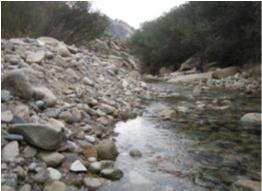Case study:The Manzanares River Restoration: Demolition of an obsolete dam and riverine ecosystem rehabilitation: Difference between revisions
No edit summary |
No edit summary |
||
| (2 intermediate revisions by 2 users not shown) | |||
| Line 1: | Line 1: | ||
{{ | {{Case study status | ||
|Approval status= | |Approval status=Approved | ||
}} | }} | ||
{{Location | {{Location | ||
| Line 203: | Line 198: | ||
}} | }} | ||
{{Measures | {{Measures | ||
|Bank and bed modifications measure= | |Bank and bed modifications measure=Bank stabilisation,Dam removal | ||
|Floodplain / River corridor=Riparian planting | |||
|Floodplain / River corridor= | |||
}} | }} | ||
{{Hydromorphological_quality_elements_header}} | {{Hydromorphological_quality_elements_header}} | ||
Latest revision as of 13:37, 1 June 2017
Project overview
| Status | Complete |
|---|---|
| Project web site | |
| Themes | Environmental flows and water resources, Habitat and biodiversity, Hydromorphology |
| Country | Spain |
| Main contact forename | CHTajo |
| Main contact surname | CHTajo |
| Main contact user ID | |
| Contact organisation | CHTajo |
| Contact organisation web site | |
| Partner organisations | |
| Parent multi-site project | |
| This is a parent project encompassing the following projects |
No |
Project summary
During the decade of the 40s, a small dam (9 meters high, 23 meters width) was built in the Manzanares River, in a site placed inside the Regional Park, in order to supply water to the village –Manzanares del Real- located few kilometers downstream. Year by year the dam has accumulated such a big quantity of sediments coming from the granite banks and slopes that at the end of the century it was completely full of sand, in such a way that it became useless.
The main target was to give back to the river the natural features it had before the dam construction and to recover the longitudinal and transversal continuity.
The river basin authority, that belongs to the Spanish Ministry of Environment -Confederación Hidrográfica del Tajo- in collaboration with other authorities (the local Council and the Madrid Autonomous Community), stated as an achievement this dam removal, in order to solve the problems the structure was inducing in the riverine ecosystem. The project has a total budget of 450.000€.
Monitoring surveys and results
Lessons learnt
Image gallery
|
Catchment and subcatchmentSelect a catchment/subcatchment
Catchment
Subcatchment
Site
Project background
Cost for project phases
Reasons for river restoration
Measures
MonitoringHydromorphological quality elements
Biological quality elements
Physico-chemical quality elements
Any other monitoring, e.g. social, economic
Monitoring documents
Additional documents and videos
Additional links and references
Supplementary InformationEdit Supplementary Information
| ||||||||||||||||||||||||||||||||||||||||||||||||||||||||||||||||||||||||||||||||||||||||||||||||||||||||||||||||||||||||||||||||||||||||||||||||||||||||||||||||||||||||||||||||||||||||||||||||||||||||||||









